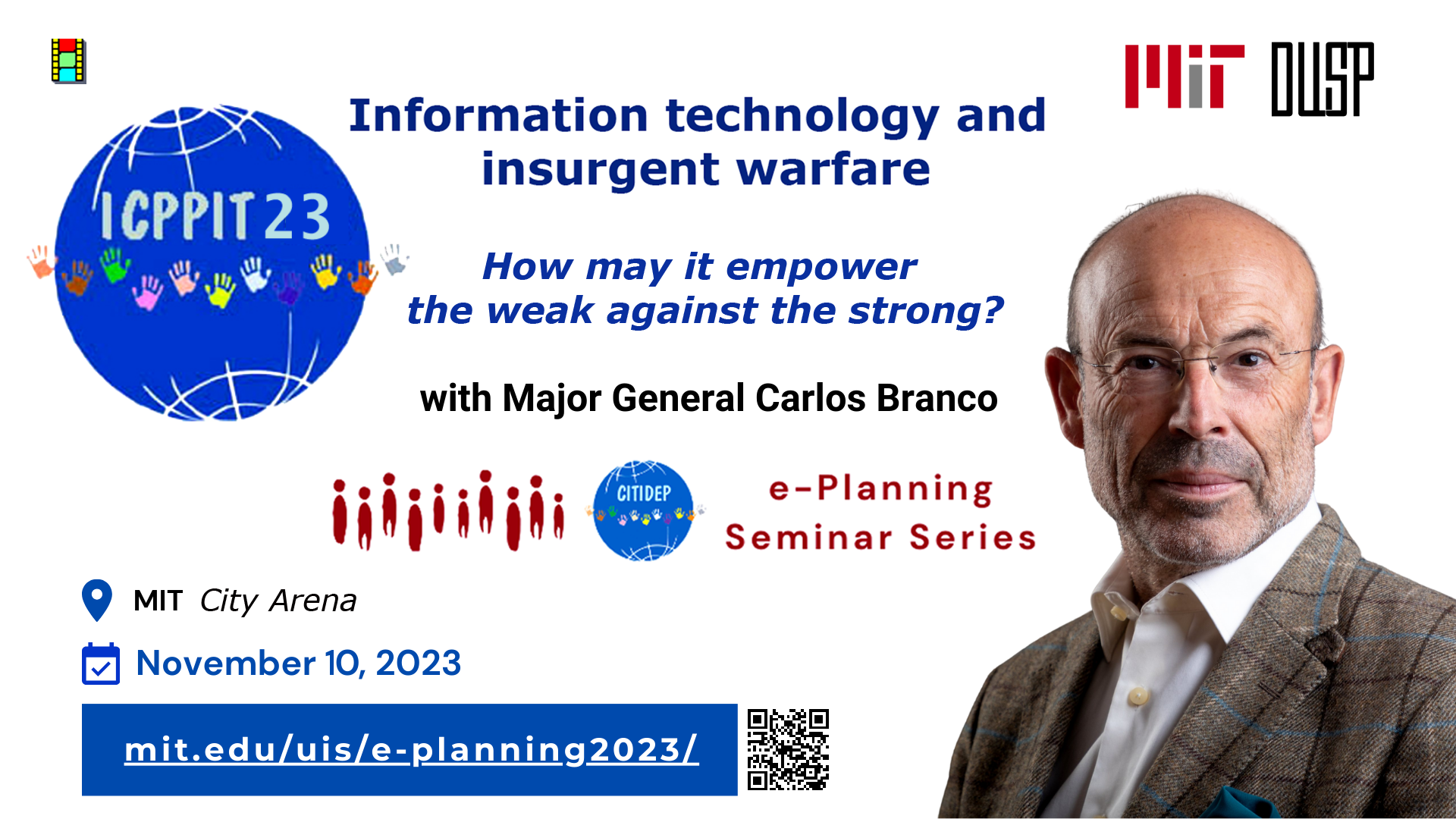

Massachusets Institute of Technology
Dept. of Urban Studies and Planning
Fall 2023 Seminar on

 |
 |
Massachusets Institute of Technology Fall 2023 Seminar on |
 |
|
e-Planning |

by Major-General Carlos Branco, NATO (retired)
This paper aims at understanding the conditions under which backward and retrograde insurgent groups may use information technologies in insurgent warfare into their benefit and prevail in a military confrontation with advanced armies from industrialised societies.
We will follow a threefold approach: to identify strengths and weaknesses in the use of IT in this type of conflicts, especially in what regards their contribution to the fight of winning hearts and minds; to understand when and how the abusive use of IT may be detrimental for the user and do more harm than good; to revisit the concept of asymmetry applied to military operations, normally associated to military hardware and kinetic action, in an insurgency warfareÕs environment.
We will use the two decades of international engagement in counter insurgency in Afghanistan to study how the Taleban, hostile to progress and science, rapidly understood the crucial importance of using IT properly and adapted to reach their communicational goals, a decisive factor to reach competitive advantage in this type of war.
Carlos Branco is a retired Major General (MG) with the Portuguese Army. He has extensive experience in political-military matters and international relations gained in 10 years serving in various international organizations, such as the UN, NATO, EU and OSCE. In the first two, he worked both in missions and headquarters, in the latter, he served as elections monitor; with the EU, he worked in close cooperation with EU Military Staff on military cooperation matters.
Within the framework of the UN, he served in the Balkans before Dayton as military observer, and in New York, at the UN Headquarters, as desk officer for the UN missions in the Middle East (Lebanon, Syria, Israel and Iraq/Kuwait border). In the former function, he liaised and negotiated with the warring parties (Bosnian Serbs, Muslims, and Croats) to ensure the conclusion of the separation of forces, and to diffuse any incidents that could lead to the reopening of hostilities; and with other accredited NGO's in their humanitarian effort, most notably with ICRC and MSF in Krajina. In the latter function, he provided advice to the heads of the military components of the Department of Peacekeeping Operations (DPKO)-led operations on technical aspects of military operations, such as contingency planning, force rotations, and operational reporting, in coordination with the integrated operational teams, to ensure that military aspects of the missions are properly integrated or coordinated. Still with the UN, he served as senior consultant to the UN mission in the Central African Republic with the task of reviewing, evaluating, and consulting the policies and procedures to all mission components (military and police).
With NATO, MG Branco served in Afghanistan as spokesperson for the Commander of the NATO Force, and as director of ISAF Strategic Communication; and at the NATO Headquarters (Brussels), as Director of Cooperation & Regional Security, in which capacity he was responsible for the strategic planning of NATO military cooperation with its 41 partners countries located in Eastern Europe, South Caucasus, Central Asia, South-Eastern Asia, North Africa and Middle East (included in the Partnership for Peace, Mediterranean Dialogue, Istanbul Cooperation Initiative and Partners Across the Globe). This includes Russia, Ukraine, and Georgia. He also supported NATO Defense Sector Reform activities and democratic control of armed forces of former communist States.
MG Branco was still deployed to EUROFOR, in Florence (Italy), as Chief of the Intelligence Section and in that capacity monitored the political, security and humanitarian situation in Bosnia-Herzegovina, Albania, Kosovo and Former Yugoslav Republic of Macedonia.
He was also assigned as National Defence Institute (IDN) Deputy Director, War College Deputy Director, and Army Director of Doctrine. Currently, MG Branco writes for various Portuguese newspapers, has an opinion column in "Jornal Econ—mico", and is a daily presence in CNN Portugal as military specialist on conflict issues. He also lectures in several higher education institutions Conflict Resolution, Peace Operations, and International Relations; and coordinated/participated in various research projects. Among others, he was member of a consulting team that prepared a study on industrial policy for the Angolan's government; was scientific co-coordinator of the research project on the "Portuguese Participation in Peace Operations"; he was responsible for the project led by the IDN "Peace-making and Conflict Resolution in Africa: Portugal and CPLP; and was scientific co-coordinator of the post-graduate studies in Communication and Crises Management.
Moreover, he authored more than 100 articles on technical-military, management, conflict resolution, and security and defence matters, four books and co-edited six. The last co-edited is entitled "The geopolitics of Iran" (Palgrave, 2021), and the last authored is entitled "Afghanistan - episodes of a Lost War" (2021).
Among other higher education, MG Branco attended an MBA in management (Specialization on International Management) and attends a Ph.D. program on Conflict Resolution. He is Member of the Editorial Councils of the "Military Sciences Review" (War College) and "Na¨‹o & Defesa" (National Defence Institute).
 |